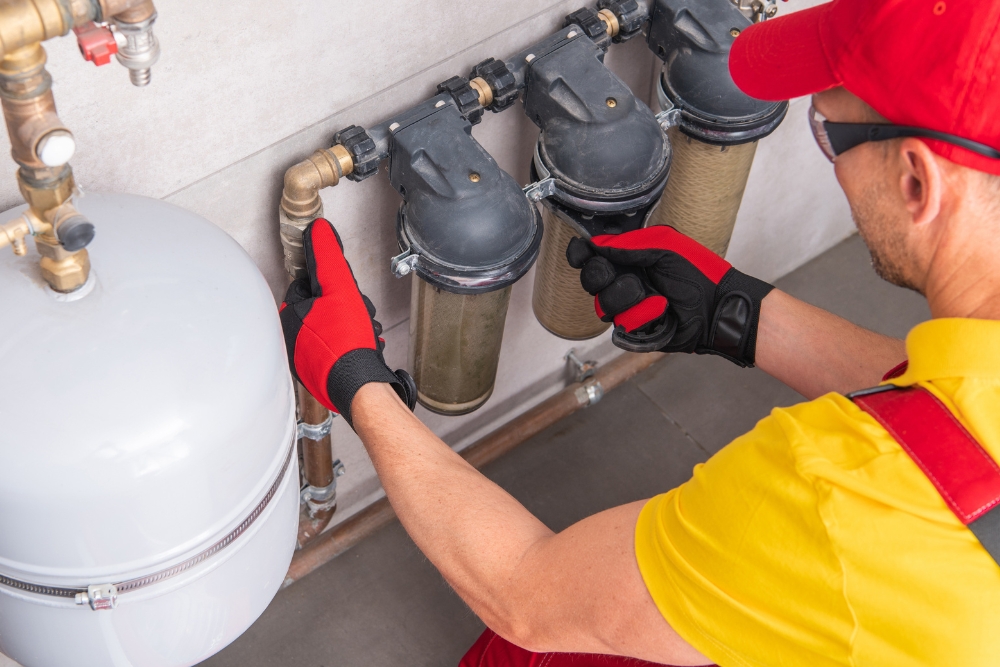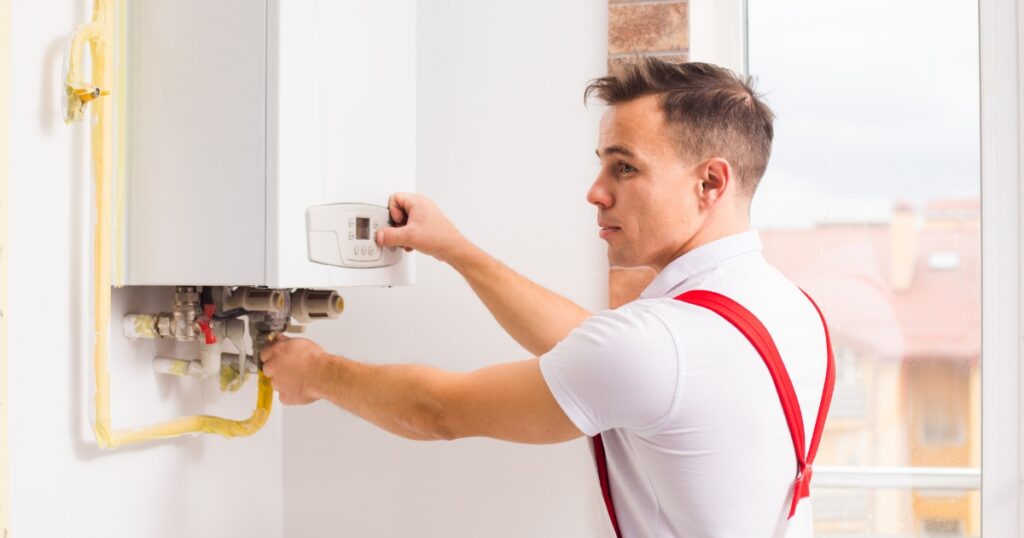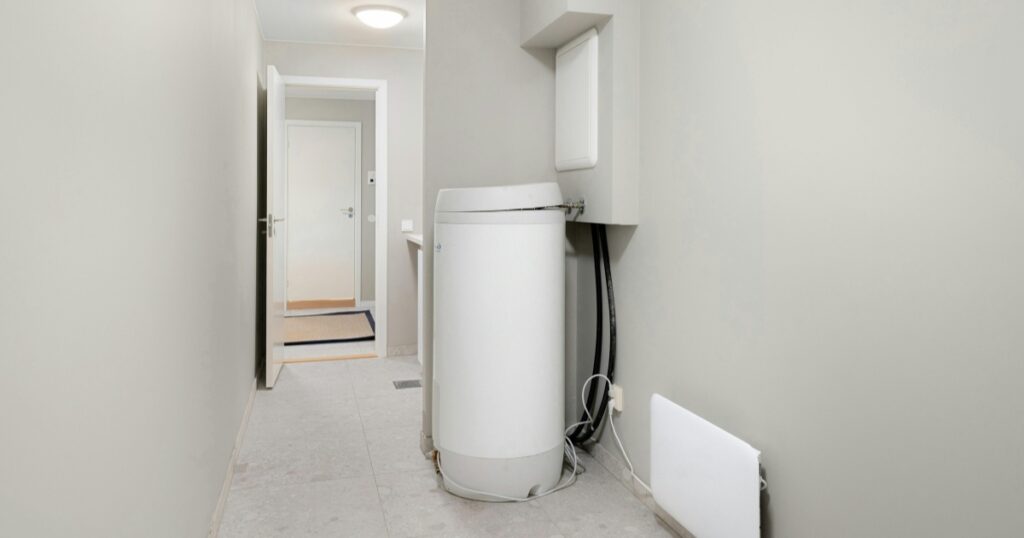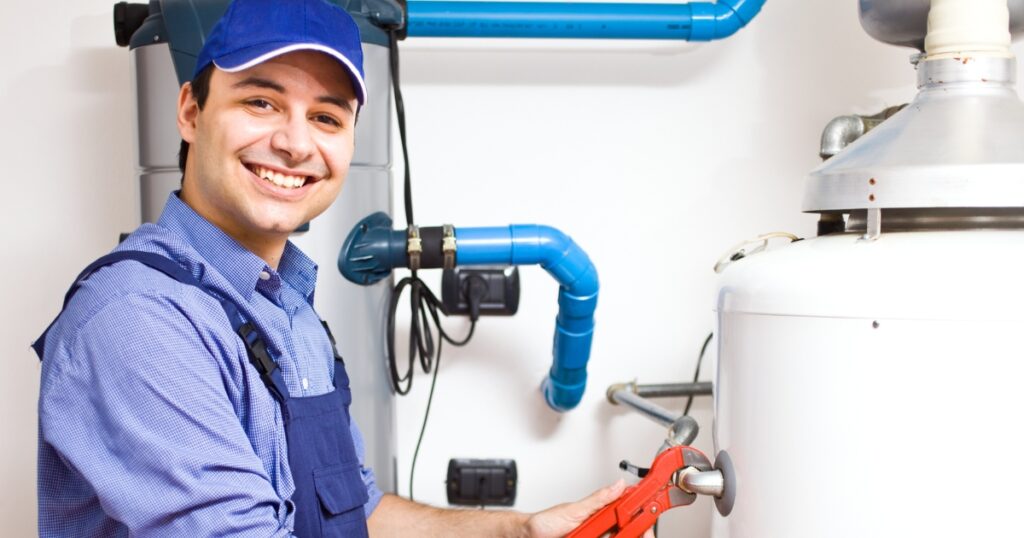Is your hot water just not cutting the mustard anymore? You’re definitely not on your own; we’ve trodden that frustrating path too. That’s why we’ve put in the hard yakka, diving deep into everything you need to understand about tinkering with or swapping out those dodgy service filters in your hot water system.
Key Takeaways
- If your hot water system shows signs like insufficient hot water, fluctuating temperatures, discoloured water, or strange noises, it might be time to check the service filters. These issues can come from clogged or faulty filters that need cleaning or replacing.
- Professional plumbers play a key role in determining whether you should repair or replace your hot water service filters. They assess the condition of your system and recommend solutions to get your hot water running smoothly again.
- Regular maintenance, including filter checks every six to 12 months and flushing the tank to remove sediment build-up, is crucial for keeping your hot water system efficient. This helps prevent sudden breakdowns and extends the life of your unit.
- Considering factors such as the age of the system, energy efficiency, family size, and extent of damage will help decide if a repair will suffice or if a full replacement is needed. Newer models might offer better energy savings and suit larger households more effectively.
- When seeking repairs or replacements for your hot water system’s service filters, ensure you choose a licensed professional experienced with various types of systems—gas, electric heat pump, solar—to guarantee quality workmanship.
Common Issues with Hot Water Service Systems
Hot water systems can often run into issues, such as insufficient hot water and fluctuating temperatures. Additionally, discoloured water and strange noises are telltale signs of a faulty hot water system.
Insufficient hot water
We sometimes face the issue of not getting enough hot water, which can be frustrating, especially during colder months. This problem often indicates that our hot water system might need servicing or potentially a filter replacement.
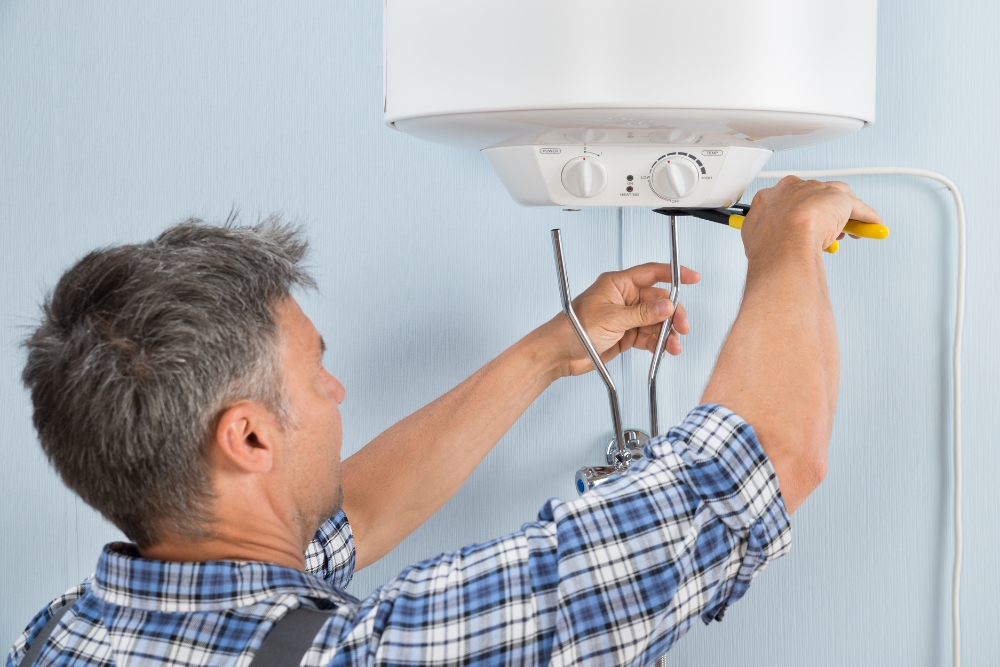
Filters play a crucial role in maintaining the efficiency and longevity of the system, particularly because they trap sediments and impurities that could reduce the flow of water.
Calling in professionals for hot water service repairs becomes essential when we notice such issues. They assess whether repairing or replacing faulty hot water service filters will solve the problem.
These experts bring their master plumbing expertise to ensure high-quality workmanship, aiming to get our systems running efficiently again. In areas with poor water quality, frequent replacements are more critical to prevent insufficient hot water situations from recurring.
Fluctuating temperatures
If you notice fluctuating temperatures in your hot water system, it could be due to a faulty thermostat or sediment buildup in the tank. Sediment can create hot spots leading to inconsistent heating.
To address this issue, consider flushing the tank regularly and having a professional inspect and clean the heating elements. Another potential cause of temperature fluctuations is a malfunctioning thermostat, which may need recalibration or replacement if found faulty.
Regular maintenance and filter replacements are essential for keeping your hot water system functioning optimally. If you suspect that fluctuating temperatures are indicating an underlying problem with your hot water service filters, it’s crucial to seek professional assistance promptly to avoid further issues down the line.
Discoloured water
How to recognise discoloured water: The appearance of discoloured water from your hot water taps can be concerning. It often indicates the presence of rust or sediment in the system, which can affect its performance and possibly cause damage.
Discoloured water is commonly caused by corrosion inside the hot water service tank, pipes, or other components. This issue may also arise due to a deteriorating internal filter or an accumulation of minerals.
Addressing discoloured water: If you notice discoloured water coming from your taps, it’s crucial to resolve this issue promptly. Ignoring it could lead to more severe problems with your hot water system over time.
Strange noises
If your hot water system is making strange noises, it could be a sign of underlying issues. Popping or knocking sounds may indicate the presence of sediment buildup in the tank while screeching noises could point towards a malfunctioning heating element.
Ignoring these unusual sounds can lead to more significant problems down the line, so it’s crucial to address them promptly.
Contacting a professional plumber for an inspection and maintenance service can help identify and resolve any issues causing strange noises in your hot water system. Regular cleaning and flushing of the tank can also prevent sediment buildup and minimise disruptive sounds.
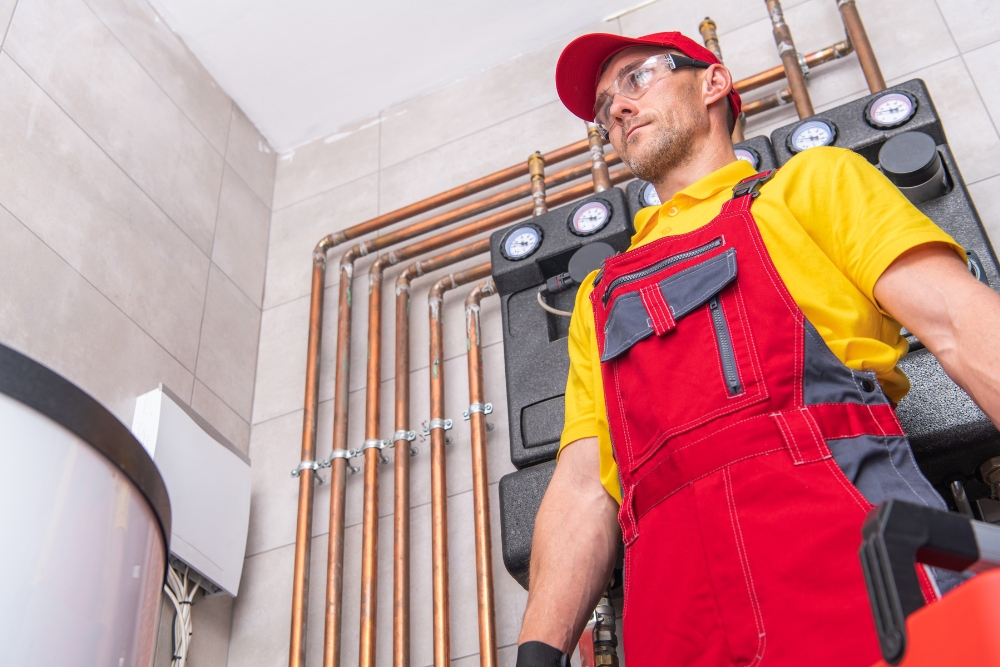
Factors to Consider Before Repairing or Replacing a Hot Water System
Before making a decision, consider the age of your system, the extent of damage, its energy efficiency, and your family size. Learn how these factors can impact your choice by reading on.
Age of the system
The age of your hot water system plays a crucial role in determining whether to repair or replace it. Older systems may be less energy-efficient and more prone to breakdowns, leading to higher repair costs over time.
If your system is nearing the end of its expected lifespan, replacing it with a newer, more efficient model could save you money in the long run.
Newer models are designed with improved energy-saving features and advanced technology, providing better performance and reliability. Considering the average lifespan of most hot water systems ranges from 10 to 15 years, assessing the age of your system is essential when weighing the decision between repairs and replacement for optimum efficiency and cost-effectiveness.
Extent of damage
When determining whether to repair or replace a hot water system, it’s essential to assess the extent of damage. Factors such as corrosion, leaks, or internal component breakdowns can significantly impact the overall functionality and safety of the system.
In addition to considering visual cues like rust and cracks, it is crucial to have a professional assessment that includes inspecting the tank, valves, and internal components for potential issues.
By understanding the full extent of damage, homeowners can make an informed decision on whether repair or replacement is the most cost-effective solution for their hot water system.
Energy efficiency
Hot water systems can differ in their energy efficiency, impacting your utility bills. Older hot water systems might not be as energy efficient compared to newer models. Installing an Energy Star-certified system or a solar hot water system could reduce your household’s energy consumption and the associated costs over time.
A professional plumber or electrician can assess the energy usage of your current system and suggest potential upgrades for better efficiency.
Considering the age and condition of your hot water system is essential before determining if repair or replacement would be more cost-effective. Replacing a filter regularly contributes to maintaining the efficiency of your hot water system over time.
Regular maintenance by qualified professionals can also keep your hot water service running efficiently, minimising unexpected breakdowns and costly repairs down the line.
Family size
Considering family size is crucial when determining whether to repair or replace a hot water system. A larger family typically requires more hot water for daily use, putting extra strain on the system.
If you’ve been experiencing insufficient hot water or fluctuating temperatures, it may be time to think about replacing your current unit with a larger capacity one. Additionally, households with varying schedules and peak demand times should also factor this into their decision-making process.
When calculating the appropriate hot water system size for your family, consider consulting a professional who can assess your specific needs based on the number of people in your household, their showering habits, and the types of appliances using hot water regularly.
Hot Water System Repair Solutions
When encountering issues with hot water systems, consider the type of system you have before proceeding. Electric, gas, solar, or heat pump systems each require individualised repair approaches.
Seek professional advice to determine the most effective solution for your specific hot water system problem.
Electric systems
When considering hot water system repairs, it’s essential to address issues with electric systems promptly. Our expert professionals are well-versed in diagnosing and repairing a range of electrical hot water system problems, from faulty heating elements to malfunctioning thermostats.
With their expertise, you can trust that your electric hot water system will be back up and running efficiently in no time.
For those unsure about the best course of action for their electric hot water system, our team is equipped to offer guidance on whether repair or replacement is the most cost-effective solution.
By addressing concerns such as fluctuating temperatures or insufficient hot water, we ensure that your electric hot water system is tailored to meet the needs of your household. Contact us today for swift and reliable service.
Gas systems
Gas systems are a popular choice for hot water heating, known for their energy efficiency and quick recovery times. When maintaining a gas hot water system, it’s crucial to have regular professional inspections to ensure the unit is working optimally.
Keeping the gas system filters clean and well-maintained can help in preventing issues with water flow and temperature control, thus avoiding costly repairs or replacements.
It’s important to schedule routine servicing every 12 months from a qualified professional to keep your gas hot water system running efficiently. Regular maintenance not only extends the lifespan of the unit but also ensures that any potential issues are caught early, saving you both time and money in the long run.
This type of proactive approach keeps your home’s hot water supply reliable and consistent.
Solar systems
When considering solar hot water systems, it’s important to note that they can be a cost-effective and environmentally friendly option for homeowners. Solar systems use natural sunlight to heat water, reducing energy bills and carbon footprint.
The installation of solar hot water systems is also supported by rebates in Australia, making them an attractive choice for those looking to reduce their environmental impact while saving on utility costs.
When choosing solar hot water systems, it’s essential to consider the geographical location and amount of sunlight received throughout the year. In areas with ample sunlight, solar systems can be highly efficient; however, in regions with limited sunlight exposure, alternative options may need to be considered.
Evaluating the potential savings and performance of solar hot water systems against other available options will help homeowners make informed decisions about their investment in long-term efficiency and reliability.
Heat pump systems
We repair and service heat pump systems, offering efficient solutions for your hot water needs. Our professional team provides expert support for heat pump maintenance, troubleshooting, and repairs.
When considering a heat pump system, it’s essential to understand its energy efficiency benefits and potential cost savings.
Heat pump systems operate by transferring heat from the air into the water, making them an eco-friendly choice. Regular maintenance is crucial to ensure optimal performance and longevity of these systems.
Signs It’s Time to Replace Your Hot Water System
When the hot water system requires frequent repairs, it may be an indication that it’s time for a replacement. An outdated unit that struggles to meet the household’s hot water demands can also signal the need for a new hot water system.
Frequent repairs
Frequent repairs on your hot water service can be a hassle, and they may indicate underlying issues that require attention. If you find yourself frequently calling for repairs, it might be time to consider the cost of these repairs compared to investing in a new system.
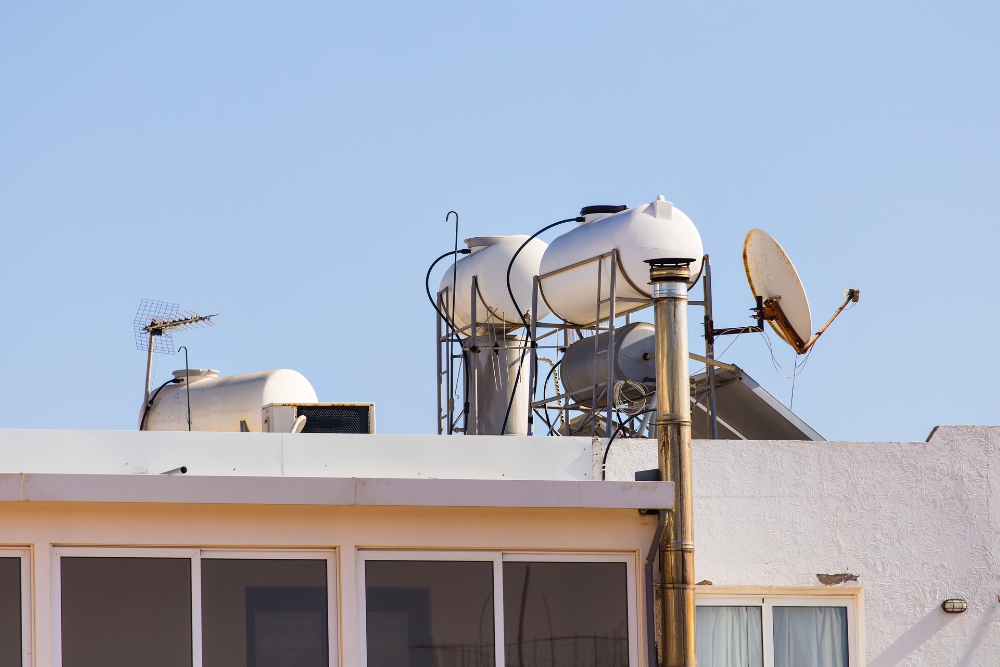
This is especially true if your hot water system is older or showing signs of significant wear and tear. Additionally, frequent breakdowns can lead to increased energy bills, adding further expense over time.
It’s important to stay aware of the frequency of repairs and evaluate whether it’s more cost-effective in the long run to replace your hot water system.
Outdated unit
If you have an older hot water system that’s showing signs of wear and tear, it may be time to consider a replacement. Older units are often less energy-efficient and require more frequent repairs, leading to higher maintenance costs in the long run.
Additionally, advancements in technology have made newer models more efficient and cost-effective, which can ultimately save you money on your energy bills over time. It’s worth considering replacing your outdated unit with a newer model that meets your family’s hot water needs while also being more environmentally friendly.
When it comes to deciding whether to repair or replace an outdated unit, factors such as the age of the system and its efficiency should be taken into account. If your current hot water system is struggling to keep up with your family’s demands or is consuming excessive amounts of energy, it may be time for an upgrade.
Unsatisfactory for family size
When considering whether to repair or replace a hot water system, the family size is an important factor. If the current hot water system is consistently struggling to meet the demand for hot water in your household, it may be unsatisfactory for your family size.
This can lead to frequent frustrations of running out of hot water during peak usage times, causing inconvenience and discomfort for everyone at home.
A larger family typically requires a more robust and efficient hot water system to cater to the increased demand. So, if you find that your current system is not meeting these needs, it might be time to consider replacing it with a unit better suited for your family size.
Preventive Maintenance Tips for Hot Water Systems
Regular inspections ensure early detection of issues.
Flushing the tank removes sediment buildup.
Regular inspections
We conduct regular inspections of our hot water system, checking for any signs of wear and tear. Our plumbers or electricians can identify potential issues early on, ensuring efficient functioning and preventing costly breakdowns.
Filters should be checked every six to 12 months, with more frequent replacements as needed in areas with poor water quality. Keeping up with regular checks helps maintain the system’s efficiency and extends its lifespan while avoiding sudden inconvenience.
Inspections help us keep an eye out for leaks or other problems that may cause damage to our hot water service over time. Our professional expertise allows us to address any concerns promptly, ensuring a reliable supply of hot water whenever we need it.
Flushing the tank
When flushing the tank, it is essential to turn off the power and water supply to the hot water system. Connect a hose to the drain valve at the bottom of the tank, then open both the pressure relief valve and drain valve to release any sediment or debris.
Once clear water flows through the hose, close both valves, remove the hose and turn on the water supply followed by restoring power to your hot water system.
Regular flushing of your hot water system helps in removing sediment buildup inside which can affect its efficiency. This simple maintenance task can extend the life of your unit while ensuring you have access to clean and consistent hot water.
Checking for leaks
After flushing the tank, it’s essential to check for leaks in your hot water system. Leaks can lead to water wastage and potential damage to your property. Look for visible signs of leakage such as pooling water around the base of the unit or damp areas on walls or floors.
Also, be attentive to any dripping sounds coming from the system.
If you detect a leak, turn off the water supply to prevent further damage and seek professional assistance promptly. A qualified plumber can inspect the system, pinpoint the source of the leak, and provide expert repairs using high-quality materials.
Choosing the right repair professional
When selecting a repair professional for your hot water system, consider their expertise in handling different types of systems, such as gas, electric, heat pump, and solar. Look for a licensed plumber or electrician with specialised experience in hot water system repair.
It’s important to hire professionals who are familiar with the specific brand and model of your hot water system to ensure efficient and accurate repairs.
Before engaging a repair professional, check customer reviews and ask for recommendations from family and friends to find a reliable and reputable service provider near you. Additionally, ensure that the chosen professional is knowledgeable about water filter maintenance and replacement intervals to maintain the quality of your hot water supply.
Efficient Hot Water Solutions for Your Comfort Today!
When considering hot water system issues, professional repairs should be sought based on the expertise required. Regular filter replacements are essential for maintaining the efficiency of water filtration systems.
Homeowners can seek prompt service from qualified electricians or plumbers in their area to address any hot water system concerns effectively. Prompt action and regular maintenance can ensure the longevity and efficient operation of hot water filters and systems over time.
Say goodbye to impurities in your hot water! Get your faulty hot water service filters repaired or replaced today. Contact us now!

